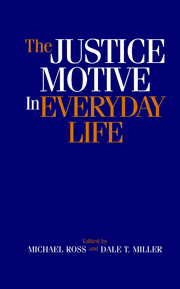Book contents
- Frontmatter
- Contents
- List of Contributors
- Introduction
- Theoretical Perspectives on the Justice Motive
- Victim Derogation and the Belief in a Just World
- The Justice Motive and Prosocial Behavior
- 11 Just World, Social Responsibility, and Helping Behavior
- 12 Policies to Redress Social Injustice: Is the Concern for Justice a Cause Both of Support and of Opposition?
- 13 Justice and Empathy: What Motivates People to Help Others?
- 14 The Justice Motive and Altruistic Helping: Rescuers of Jews in Nazi-Occupied Europe
- 15 Acting Righteously: The Influence of Attitude, Moral Responsibility, and Emotional Involvement
- Justice-Based Reactions to Transgressors
- Justice and Reaction to One's Own Fate
- Name Index
- Subject Index
11 - Just World, Social Responsibility, and Helping Behavior
Published online by Cambridge University Press: 08 September 2009
- Frontmatter
- Contents
- List of Contributors
- Introduction
- Theoretical Perspectives on the Justice Motive
- Victim Derogation and the Belief in a Just World
- The Justice Motive and Prosocial Behavior
- 11 Just World, Social Responsibility, and Helping Behavior
- 12 Policies to Redress Social Injustice: Is the Concern for Justice a Cause Both of Support and of Opposition?
- 13 Justice and Empathy: What Motivates People to Help Others?
- 14 The Justice Motive and Altruistic Helping: Rescuers of Jews in Nazi-Occupied Europe
- 15 Acting Righteously: The Influence of Attitude, Moral Responsibility, and Emotional Involvement
- Justice-Based Reactions to Transgressors
- Justice and Reaction to One's Own Fate
- Name Index
- Subject Index
Summary
This chapter attempts to integrate research on belief in a just world and social responsibility. First, the concepts of belief in a just world and social responsibility are described in some detail, and common aspects and differences are pointed out. On the basis of this discussion, two hypotheses are derived that refer to the overlap between just world belief and social responsibility and to the prediction of prosocial behavior. In the second part, empirical results that bear on the hypotheses are reported. Finally, some variations in the meaning of belief in a just world are considered, and a possible explanation is offered for the finding that belief in a just world is sometimes positively and sometimes negatively related to prosocial behavior.
Belief in a Just World
Just world theory is one of the key theories in social psychology (Lerner, 1980), and a central component of this is the belief in a just world construct. The belief in a just world may be defined as a belief system that rests on the premise that in general people get what they deserve. This assumption – which certainly is not confirmed in reality – is a positive illusion (cf. Taylor & Brown, 1988) and serves as a protection against the possibility that fate is uncontrollable and arbitrary. The development of the belief in a just world is closely linked to the development of a personal contract (Lerner, 1974). The child assumes that the world is a just place.
- Type
- Chapter
- Information
- The Justice Motive in Everyday Life , pp. 189 - 203Publisher: Cambridge University PressPrint publication year: 2002
- 16
- Cited by

